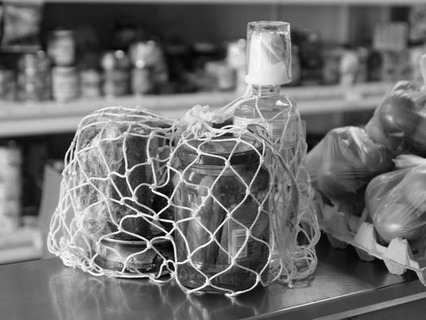The topic of plastic has been 'trending' in mainstream media and in day-to-day conversation. It is more common now to see images of animals, especially marine life, dying because of their unknowing consumption of plastics.
This photo shows plastic bags removed from a pilot whale that was floating off the shores of Thailand. Upon being rescued, the whale began vomiting pieces of plastic and died soon after. There were 80 plastic bags weighing more than 17 lbs inside its stomach.
Plastic bags removed from a pilot whale's stomach. Photo: Smithsonian Magazine
So how does this and the Soviet Union come together? Bare with me... we're getting there.
Let's go back to 1965. A Swedish company by the name of Celloplast obtained a U.S. patent for the idea of what would later be known as the "T-shirt plastic bag" and thus, the plastic bag that we use today was born.
The "T-shirt plastic bag" design filed at the U.S. patent office
Though these bags were introduced, initially, the public didn't buy in to the idea, and for many years, still preferred paper bags for their groceries. This changed in 1985 when Robert Bauman of Chem Systems announced at the New Materials and Profits in Grocery Sacks and Conextrusions Conference, that plastic bags were 11.5% cheaper than paper bags (Vince Staten, Can you Trust a Tomato in January). Staten adds that according to Plastics World magazine, "plastic bags were in only 10 percent of the supermarkets in 1983. By the end of 1985 that had leaped to 75 percent."
1985 was significant as well in the Soviet Union. This is the year that Mikhail Gorbachev took office as the General Secretary of the Soviet Union. With it, he brought glasnost (openness) and perestroika (restructuring), which also meant that the Soviet Union's borders were more open to foreign tourists. According to a Los Angeles Times article, Gorbachev Sparks New interest: More Americans visiting Soviet Union This Year published on July 18, 1987, the Soviet Union "expected a record number of foreign tourists in 1987."
As plastic bag usage began to grow in the United States, the Soviet Union kept on with its use of reusable bags. The net bags seen above were very popular and durable. In the Soviet Union, and even in post-Soviet society, reusing bags, or taking in glass bottles for payment was very common. Yet plastic bags were intriguing, as were most things American.
My mother grew up in Soviet Armenia and lived for many years in Soviet Estonia. As a student in grammar school, she recalls her staunch communist teacher speaking to the class about how Americans had invented the plastic bag, and saying "Who cares! We've invented more important things!"
Yet, anti-American speeches didn't do much to keep people away from American-made items. She also recalls that when family from the States would visit, they would bring gifts in plastic bags. They would treasure these bags, as they would treasure anything American, and would walk around town with pride that they were carrying a plastic bag. They would gently wash and iron these bags so that they would look brand new for their next parade around town. This held true in Estonia as well.
With the borders now more open, and with plastic bags more available to Americans, Soviet families began to become more accustomed to them, and viewed them as a sign of wealth, because America equaled wealth.
Photo: Sergei Zhukov, Anatoly Semenikhin/TASS
I was recently speaking with a zero-waste enthusiast friend of mine who was visiting Armenia, about her frustration with plastic waste around Yerevan. One of the easiest ways someone can reduce plastic waste is by carrying their own reusable shopping bag. Even as she traveled, she took her reusable bag with her. Many times, she got confused stares from fellow shoppers, and someone even said that by bringing in a reusable bag you create an image of being cheap.
This mindset that plastic bags are grander because they're American or European, and not Soviet, has stuck, but hopefully this will change. Foreign tourists unknowingly made plastic bags popular in the Soviet Union, so I have confidence that today's sustainable minded tourists can create change again - this time, away from plastics.






